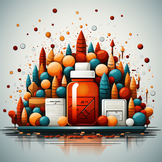Can antihistamines cause erectile dysfunction?
- Understanding Antihistamines
- Interactions Between Antihistamines and Hormones, Nerves, and Blood Circulation
- Antihistamines' Impact on Sexual Desire and Erectile Dysfunction
- Cimetidine: A Unique Antihistamine with Antiandrogen Properties
- Effects of Antihistamines on Testosterone Levels and Sexual Dysfunction
- Medications and Sexual Side Effects: A Look Inside the Medicine Cabinet
- Histamines and their Role in Erections
- The Importance of Consulting a Healthcare Provider When Experiencing Sexual Side Effects from Antihistamines
- Alternative Allergy Medications and ED
- Antihistamines, ED, and Reversibility
- The Relationship Between Antihistamines and Erectile Dysfunction

Understanding Antihistamines
Antihistamines are a class of medications that inhibit the effects of histamines, chemicals that the body produces as part of its natural defense mechanism. The body releases histamines in response to a perceived threat, such as allergens. These chemicals cause symptoms that we associate with allergic reactions, such as sneezing, itching, runny nose, and watery eyes.
Antihistamines help to alleviate these symptoms.
Commonly used antihistamines include Benadryl, Dramamine, Phenergan, Chlor-Trimeton, and Tagamet. These medications are used for a variety of reasons ranging from treating allergies, heartburn, to motion sickness.
Interactions Between Antihistamines and Hormones, Nerves, and Blood Circulation
Antihistamines work by blocking histamine receptors in various parts of the body. While their action primarily targets the immune system, these drugs can also impact other body systems, including the hormonal and nervous systems, and blood circulation.
When it comes to hormones, antihistamines can interfere with the regulation of testosterone levels. Some research suggests that certain antihistamines may have antiandrogen properties, which means they can block the effects of androgens, male sex hormones like testosterone. Cimetidine, a type of antihistamine, is known for this property.
Antihistamines can also impact the nervous system. They have sedative effects which can affect the nerves controlling sexual function. Lastly, these medications can influence blood circulation. They cause blood vessels to constrict, reducing blood flow, which can potentially impact erectile function.
Antihistamines' Impact on Sexual Desire and Erectile Dysfunction
Antihistamines, due to their interactions with hormones, nerves, and blood circulation, may indirectly influence sexual desire and contribute to erectile dysfunction (ED). It is important to note, however, that this side effect is not universal to all antihistamines or all individuals taking these medications.
Cimetidine: A Unique Antihistamine with Antiandrogen Properties
Cimetidine stands out among antihistamines due to its antiandrogen properties. It is commonly used to treat heartburn but may influence testosterone levels and potentially lead to sexual dysfunction. Some studies indicate that men taking cimetidine may experience reduced libido and difficulties achieving an erection.
Effects of Antihistamines on Testosterone Levels and Sexual Dysfunction
When antihistamines influence testosterone levels, this can lead to changes in sexual desire and performance. Reduced testosterone can result in decreased libido and ED. However, this does not mean that all antihistamines will lead to sexual dysfunction. It's essential to understand that the effects can vary greatly between different medications and individuals.
Medications and Sexual Side Effects: A Look Inside the Medicine Cabinet
Many medications, not just antihistamines, can have sexual side effects. Medicines for high blood pressure, depression, and anxiety, for instance, can also cause ED. This makes it crucial to discuss any concerns with a healthcare provider before making changes to a medication regimen.
Histamines and their Role in Erections
Interestingly, while antihistamines can contribute to ED, histamines themselves have a complex role in erections. Some research indicates that histamines may facilitate erection, while other studies suggest they may contribute to premature ejaculation. Thus, the relationship between histamines, antihistamines, and erectile function is a complicated one.
The Importance of Consulting a Healthcare Provider When Experiencing Sexual Side Effects from Antihistamines
Experiencing sexual side effects from antihistamines, or any medication, can be distressing. It's essential to consult a healthcare provider if you notice these changes. They can provide advice, explore alternative treatments, and in some cases, help to reverse the effects.
Alternative Allergy Medications and ED
For those experiencing ED from antihistamines, alternative allergy medications are available. Not all antihistamines are associated with ED; for example, Zyrtec is not commonly linked to this side effect. However, individual responses can vary, and it's crucial to consult with a healthcare provider for personal advice.
Antihistamines, ED, and Reversibility
The effects of antihistamines on ED can often be reversed by either stopping the medication or switching to a different one. However, it's crucial not to stop or change medications without consulting a healthcare provider.
The Relationship Between Antihistamines and Erectile Dysfunction
In conclusion, while some antihistamines have been associated with ED, this is not a universal effect, and many factors can influence an individual's response. The relationship between antihistamines and erectile function is complex and affected by factors like the specific antihistamine in use, its effects on hormones, nerves, and blood circulation, and individual patient characteristics. It's crucial for patients experiencing ED related to antihistamines to consult with a healthcare provider to find the best treatment strategy.



